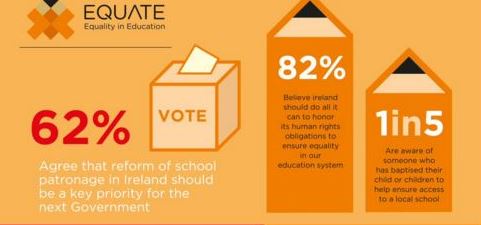Often, the most interesting aspect of a survey is not the answers given but the questions asked. One of the first things the newly established lobby group EQUATE (Equality in Education) did was to commission a poll on people’s views on education.
Between 77% and 87% of respondents answered “yes” to the questions asked, which are outlined below (with the exception of question b: 62% of respondents agreed with this). EQUATE is using these results to argue that there is strong public support for their core aims, which include: (i) stripping faith schools of their right to use religion as an admissions criterion in the event of oversubscription; and (ii) confining a faith school’s ethos to one class of religious instruction per day.
I think these two aims of EQUATE are well intentioned but wrongheaded and, if realised, will end up working an injustice against religious parents who want a truly faith-based education for their children. At the same time, if the above mentioned questions in the EQUATE poll were put to me I’d be inclined to answer “yes” to all of them. The problem with many of the questions is that they are equivocally stated– a consequence of reducing complex matters of public policy to an overly simplified statement of abstract principle. Here are the questions/statements and my answers:
(a) Should Ireland do all it can to meet its human rights obligations to ensure equality in our education system?
I would answer Yes to this. Yet there is no obligation under international human rights law to disallow faith schools to use religion as an admissions criterion in the event of oversubscription, or to require faith schools to confine their ethos to one class of religious instruction per day.
Apart from that, ‘equality’ can easily be taken to mean that all parents should have equal access to a school of their choice for their children. Obviously this does not currently exist in Ireland, but saying you are for “equality” cannot simply be taken to mean that a school cannot have an admissions criteria that is justified by the ethos and purpose of the school.
(b) Should reform of school patronage be a key priority for the next Government?
Yes. In fact, it should be a priority for this Government too. But transferring patronage from a religious to a non-religious patron is not the same thing as completely disempowering the remaining faith schools to use religion as an admissions criterion in the event of oversubscription, or requiring that remaining faith schools confine their ethos to one class of religious instruction per day.
(c) Should the Irish education system be reformed so that no child is excluded because of their religion or non-religion?
Yes. However, answering “yes” to this is compatible with wanting to allow faith schools to give priority to families who share the ethos of the school in the (relatively rare) event of oversubscription. A ”yes” answer here is only incompatible with not wanting enough school places in the system to cater for every child.
(d) Does the State have a responsibility to ensure that children do not experience discrimination in the school curriculum?
Yes, I suppose – though I’m not sure precisely how a curriculum can discriminate against a child. How do ideas that are proposed as true discriminate against anybody? They might “discriminate” against opposing ideas, but that’s a different matter. Or the ideas in the curriculum may be false, but again that’s a different matter. Does EQUATE mean to suggest that a course on Christian instruction, for example, is in itself discriminatory? But that course will teach as true the unique, beautiful dignity of every child as a child of God. Furthermore, every child’s legal guardian has a right to remove the child from the course if they so wish.
Is being exposed to prayer at the start of the school day “discriminatory”.
But if a faith school cannot have school prayers at various points in the school day, then we can easily argue that it is faith schools that are being discriminated against.
(e) Do you agree that schools should not have the right to refuse admission to children with a different religion to the school’s patron?
Yes, because the question implies that the right at issue is an absolute right of a school to gratuitously and unreasonably refuse to accept children from a different ethos background, a refusal presumably motivated by animus towards persons of that religion or worldview. But I also believe that all schools should have, in the event of oversubscription, a limited power to set as an admission criterion the sharing of the school’s ethos (whatever that may be: secular, Jewish, Catholic, Presbyterian etc.) This limited power ought to be exercised with the intention of meeting the interests of families who share the school’s ethos, and certainly not with the intention of harming or denigrating families who don’t. With oversubscription there will always be a need to discriminate – part of the question is whether the discrimination is rationally related to the aims of the school.
I don’t think I’m the only one who finds EQUATE’s questions ambiguous. EQUATE also asked respondents whether they wanted to send their child to a Christian school. On the basis of the responses to the poll’s other questions, and in particular the presuppositions built into those questions, one would expect that no more than 20% would answer affirmatively to this. In fact, 54% did so. Presumably, when these respondents say that want a Christian school they mean exactly that: a Christian school, and not a school that is kind of Christian for 30 minutes a day while secular for the rest of it.
















